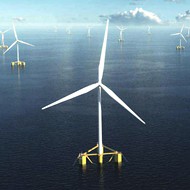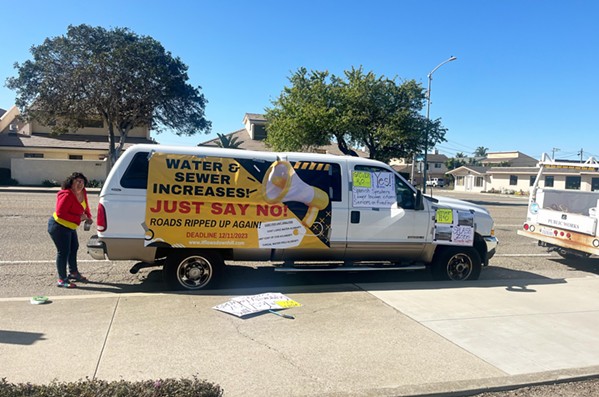[
{
"name": "Promo Temp Targeted",
"id": "PromoTempTargeted",
"class": "inlineCenter",
"insertPoint": "4",
"component": "15511697",
"requiredCountToDisplay": "0"
},
{
"name": "Ad - Medium Rectangle CC01 - 300x250 - Inline Content",
"class": "inlineCenter",
"insertPoint": "8",
"component": "15582119",
"requiredCountToDisplay": "12"
},{
"name": "Ad - Medium Rectangle LC01 - 300x250 - Inline Content",
"class": "inlineCenter",
"insertPoint": "18",
"component": "15582122",
"requiredCountToDisplay": "22"
},{
"name": "Ad - Medium Rectangle 9 - 300x250 - Inline Content",
"class": "inlineCenter",
"insertPoint": "28",
"component": "15582121",
"requiredCountToDisplay": "32"
}]
After months of tirelessly protesting against Grover Beach's new water rate structure, Grover H2O members finally received the answer they've been looking for.
During a May 13 City Council meeting, council members voted 3-1 to revise their December 2023 vote that would have increased water rates by almost 20 percent over the next four years.
"I want to retire; I don't want to have a double water rate. Repeal these right now and bring these rates back to before they were voted on," Grover H2O member Brenda Auer said during public comment at the May 13 meeting. "Bring the rates back to December, do the right thing, be heroes, be legendary tonight."
Partnered with the cities of Arroyo Grande and Pismo Beach on the Central Coast Blue water reclamation project, Grover Beach increased its water rates to help fund its portion of the facility's ever-growing cost. Originally expected to cost $93 million in 2022, the project costs increased to between $134 million and $159 million due to inflation.
That price jump was too much for the Arroyo Grande City Council, which voted to pull out of the agreement during its April 9 meeting. Grover Beach followed suit, with its council voting to opt out of the project on April 22. During that meeting, the council directed staff to return with an updated water rate structure.
Staff recommended that the council adopt a revised water rate structure that would remove all future construction-related expenses for Central Coast Blue but continue to fund operations, maintenance, and capital projects for the city's existing water system. The new rate structure would also provide $300,000 in funding for water resiliency efforts, according to the May 13 staff report.
"This rate structure would decrease overall revenue requirements by 14.5 percent in FY [fiscal year] 2023-24 with an effective rate increase of 5.2 percent over the previous year," the staff report stated. "Water rates would continue to increase by 5.2 percent annually through FY 2025-26 after which point the annual increases would be 3.5 percent through FY 2027-28."
While all council members—besides Mayor Karen Bright, who was absent—agreed to the water rate changes, they struggled to agree on the importance of funding water resilience efforts right now.
Councilmember Daniel Rushing asked whether they could put the resiliency debate on hold and consider it at a different time since the city currently has access to a decent amount of water.
"In the next cycle, it will be the full reevaluation of Grover Beach city goals, that should water resiliency bubble up to the top in this process, that we at that point dig further into what our next steps would be," he said. "It would be at that point during the next fiscal year's budgetary process that we would be identifying funds for a water resiliency effort."
Councilmember Zach Zimmerman said he disagreed—water resiliency should be at the top of the council's goals.
"Things change, and things are changing more drastically and quickly every year and every climate cycle that we are in," he said. "We are in a very wet one right now, admittedly, and it is incredible, but up and down the state and across the West the consensus is that this is a real once in a blue moon type of thing, and I think we need to plan for things happening in a different direction. I think if we are ready way ahead of schedule and we have all these resources, then amazing."
According to the staff report, it's impossible to determine when the next drought will impact the city's water supply, but based on recent history and predictions of climate change impacts, the city is likely to see a significant water supply shortage related to drought one or more times over the next decade.
"Securing supplemental water is critical to meet community needs with existing residents and businesses as well as continue to achieve additional housing and other development opportunities," the staff report stated. "The lack of additional water supply could eventually lead to a limitation or potential moratorium on additional development or issuance of building permits within the city."
The staff report also stated that with current reservoir levels, a potential water deficit could begin in 2030 based on an extended drought and if supply was reduced to a minimum level.
"Staff recommended the council consider actions to seek up to 510 acre-feet per year of additional long-term water supply that would be sufficient to make up the anticipated gap in demand by 2050 plus allow for an operational buffer of up to 15 to 20 percent of supply," the staff report said. "Staff would note that the city does not currently have a defined water supply buffer."
Councilmember Clint Weirick and Mayor Pro Tem Robert Robert agreed with Rushing that it would be better to discuss water resiliency funding at a later time. Δ
Latest in News
Readers also liked…
-

SLO police identify alleged driver who hit and killed couple
Dec 22, 2022 -

When the levee breaks: Oceano residents, county officials walk a tightrope of regulations to manage Arroyo Grande Creek, which some say led to the levee's failure in January
May 18, 2023 -

Cal Poly report highlights offshore wind's potential to spur green energy transition
Jun 8, 2023









